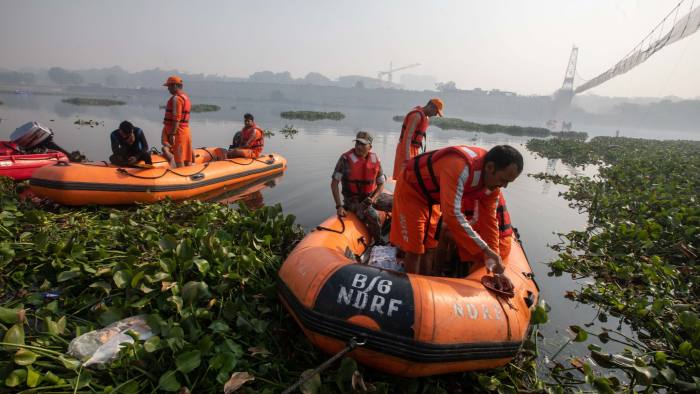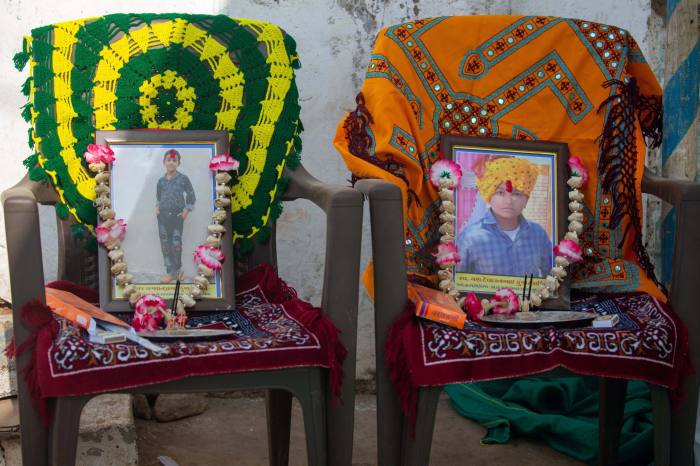
Please use the sharing tools found via the share button at the top or side of articles. Copying articles to share with others is a breach of FT.comT&Cs and Copyright Policy. Email licensing@ft.com to buy additional rights. Subscribers may share up to 10 or 20 articles per month using the gift article service. More information can be found here.
https://www.ft.com/content/b9771bdb-7271-4078-92b3-e525b3157744
It should have been a perfect outing. Last Sunday, Divya, 21, and her family took her excited niece and nephew to cross the famous pedestrian suspension bridge that since colonial times had swayed gently above the wide Machchu river in the western Indian city of Morbi. The bridge had just reopened after a renovation overseen by its operator, a subsidiary of a corporate group better known for making electric clocks. But as hundreds of holidaymakers crowded on to the narrow walkway, it suddenly collapsed. Divya was hurled into the weed-snarled water below and 135 other visitors were killed — including her niece and nephew, aged six and four. The disaster has sent shockwaves through Prime Minister Narendra Modi’s home state of Gujarat ahead of important legislative assembly elections next month. It has also sparked angry calls for accountability as the latest in a long series of infrastructure failures that many Indians blame on poor government oversight and pervasive corruption in public works. “The bridge was old, but we never thought it was fragile,” said Divya, who asked to be identified only by her first name, as she visited her injured sister at a local hospital, her own arm still in a black sling. “My nephew and niece will never come back. But let them punish those behind this tragedy. That’s all I want to see,” she said. Modi, who was in Gujarat on a three-day visit when the disaster happened, has called for a special investigation into the tragedy, widening an inquiry already started by the state’s chief minister. Police have arrested several junior employees of Oreva Group, the well-known clock producer whose subsidiary Ajanta Manufacturing had been contracted to operate and maintain the bridge. Ajanta had contracted the seven-month repair work to a different company; The Indian Express newspaper has reported that the two owners of the contractor are also in custody.

Please use the sharing tools found via the share button at the top or side of articles. Copying articles to share with others is a breach of FT.comT&Cs and Copyright Policy. Email licensing@ft.com to buy additional rights. Subscribers may share up to 10 or 20 articles per month using the gift article service. More information can be found here.
https://www.ft.com/content/b9771bdb-7271-4078-92b3-e525b3157744
Eyewitnesses said they believed too many people had been allowed on to the slim structure. “The bridge was overcrowded,” said local volunteer Arshad Bhai, who saw the collapse and guessed about 500 people were on it at the time. Officials said around 180 people were rescued from the water. The collapse follows the collapse of a highway flyover in Varanasi in 2018 that killed 18 people and another flyover failure in Kolkata in 2016 that killed 27. This year Bangalore, one of India’s richest cities, suffered extensive flooding caused by infrastructure failures. “Morbi’s disaster is another example to suggest how poor is India’s infrastructure,” said Sanjay Kumar, a professor at the Centre for the Study of Developing Societies in Delhi, who has recently completed a study on public perceptions of corruption in Gujarat. “Government can claim that they are making all effort to curb corruption in public life,” Kumar said. “But I think the reality is that there is corruption in various fields.” Now Gujarat-based Oreva, a five-decade-old electronic appliances business that was founded in Morbi, is at the centre of police inquiries — and political mudslinging. The accident comes at a sensitive time for the BJP, which dominates in its political heartland of Gujarat but is facing a challenge from the opposition Aam Aadmi party led by Delhi chief minister Arvind Kejriwal. Opposition politicians have sought to link the company to Modi’s governing Bharatiya Janata party, circulating a more than 10-year-old photograph of the company’s late founder Odhavji Raghavji Patel, known as the “father of wall clocks”, presenting Modi with flowers. Kejriwal called for the BJP Gujarat chief minister to resign, alleging at a press conference — without presenting any evidence — that “the Morbi bridge collapse was a result of massive corruption”. Narendra Taneja, a New Delhi-based former BJP national spokesperson, dismissed the opposition allegations of wrongdoing in local procurement. “It’s extremely unfortunate that on a tragedy like this they should be playing politics,” Taneja said. “We understand the feelings of the victims’ families, but at the same time they have to wait for the [state government investigation’s] finding.” Oreva did not respond to requests for comment. Analysts say that while the BJP is expected to retain its control of the Gujarat state assembly at the elections next month, Kejriwal’s AAP has been gaining traction. The BJP are “still in the pole position but there’s been a shake-up in the political composition of the state” thanks to the AAP, said Milan Vaishnav, South Asia programme director at the Carnegie Endowment for International Peace. Modi visited Morbi on Monday, promising a “detailed, impartial and extensive” probe. But some people who went to see the remains of the bridge for themselves were sceptical justice would be done. “We are being told that a full investigation will take place to find the culprits. But the inquiry will reveal nothing,” said Himanshu Rasikbhai, a banker, as he watched search boats looking for bodies on the river.









